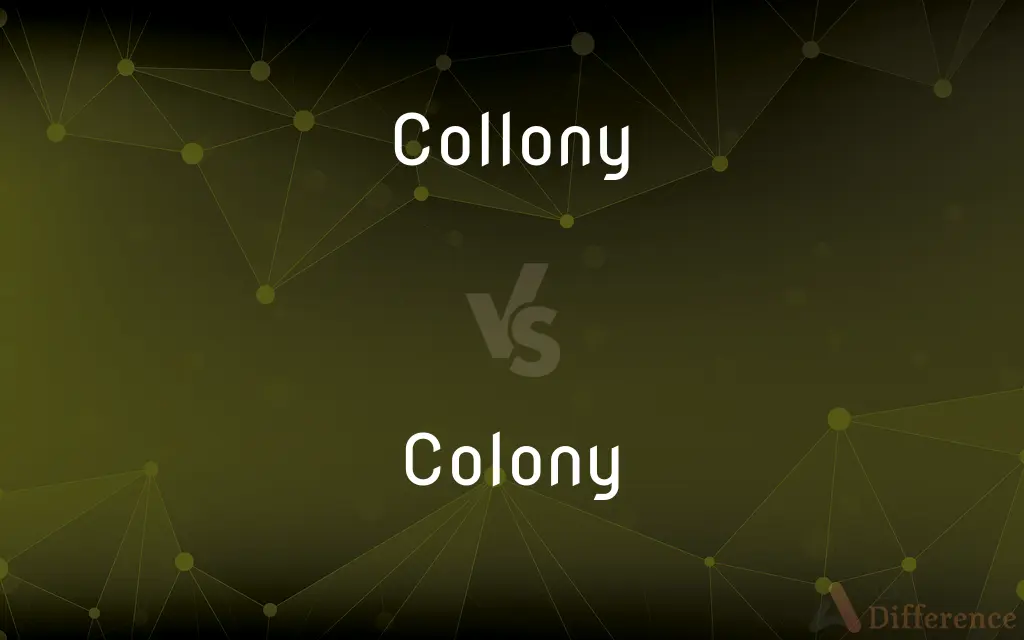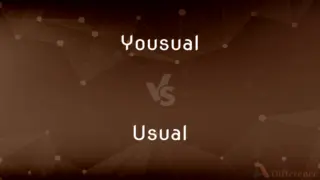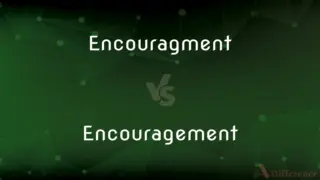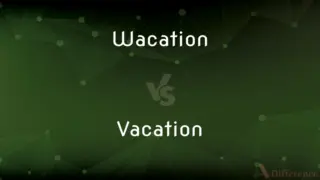Collony vs. Colony — Which is Correct Spelling?
By Tayyaba Rehman — Updated on April 4, 2024
Collony is an incorrect spelling. The correct spelling is "colony," denoting a group or territory under the control of a distant country.

Table of Contents
Which is correct: Collony or Colony
How to spell Colony?

Collony
Incorrect Spelling

Colony
Correct Spelling
ADVERTISEMENT
Key Differences
Link "colony" with "one" to remember the single "l."
Associate "colony" with "solo," both suggesting singularity, to remember the single "l."
Remember, "colony" has one "l" just like "one" group or territory.
"Collony" has an unnecessary double "l"; only one is needed.
Visualize the word "lone" within "colony," emphasizing the single "l."
ADVERTISEMENT
How Do You Spell Colony Correctly?
Incorrect: A bee collony can contain thousands of bees.
Correct: A bee colony can contain thousands of bees.
Incorrect: The British established a collony in North America.
Correct: The British established a colony in North America.
Incorrect: The collony thrived due to its successful trade.
Correct: The colony thrived due to its successful trade.
Incorrect: She studied the ant collony for her science project.
Correct: She studied the ant colony for her science project.
Incorrect: He read about the lost collony of Roanoke in his history book.
Correct: He read about the lost colony of Roanoke in his history book.
Colony Definitions
A colony refers to a group of people who settle in a distant land but remain under their native country's political jurisdiction.
The settlers established a colony on the island.
A colony denotes a group of similar organisms living together.
A colony of ants worked in unity.
A colony is an area under the political control of another country.
India was once a British colony.
A colony can mean a group of people with shared characteristics or interests living in close association.
An artist's colony thrived in the village.
In microbiology, a colony represents a community of bacteria or other microorganisms growing on a culture medium.
The petri dish displayed a colony of bacteria.
In political science, a colony is a territory subject to a form of foreign rule. Though dominated by the foreign colonizers, colonies remain separate from the administration of the original country of the colonizers, the metropolitan state (or "mother country").
A country or area under the full or partial political control of another country and occupied by settlers from that country
Japanese forces overran the French colony of Indo-China
A group of people of one nationality or race living in a foreign place
The British colony in New York
A community of animals or plants of one kind living close together or forming a physically connected structure
A colony of seals
A group of emigrants or their descendants who settle in a distant territory but remain subject to or closely associated with the parent country.
A territory thus settled.
A region politically controlled by a distant country; a dependency.
A group of people with the same interests or ethnic origin concentrated in a particular area
The American colony in Paris.
The area occupied by such a group.
Colonies The British colonies that became the original 13 states of the United States.
A group of people who have been institutionalized in a relatively remote area
An island penal colony.
A group of the same kind of animals, plants, or one-celled organisms living or growing together.
A visible growth of microorganisms, usually in a solid or semisolid nutrient medium.
An area under the political control of another country and typically occupied by settlers (colonists) from it, or by their descendants.
Much of the eastern United States was formerly a British colony; other areas were French, Spanish, Dutch, or Swedish colonies.
Bermuda is a crown colony of Great Britain.
A group of people who settle such an area and maintain ties to their native country, and (later) their descendants.
A group of people, of one nationality, ethnic group, or language, residing in a different country, city, or area; the area such people occupy.
A colony of British expats in Spain
The Amana Colonies in Iowa were settled by people from Germany.
A group of people with similar interests, occupations, or characteristics, living in a particular area; the area such people occupy.
A nudist colony; the statue was put up right in the middle of the artist colony
A leper colony on the outskirts of town; most buildings in the penal colony were made of concrete
(biology) A group of organisms of same or different species living together in close association.
Ant colony; coral colony
A colony of specialized polyps and medusoids
A group of bacteria, fungi or other cells cultured together, especially from a single cell.
Colonies of stem cells
(India) An apartment complex or neighborhood.
Our colony is quite small, but each apartment is large.
A local group of Beaver Scouts.
A potential new chapter of a fraternity or sorority awaiting official recognition from their headquarters.
A company of people transplanted from their mother country to a remote province or country, and remaining subject to the jurisdiction of the parent state; as, the British colonies in America.
The first settlers of New England were the best of Englishmen, well educated, devout Christians, and zealous lovers of liberty. There was never a colony formed of better materials.
The district or country colonized; a settlement.
A territory subject to the ruling governmental authority of another country and not a part of the ruling country.
A company of persons from the same country sojourning in a foreign city or land; as, the American colony in Paris.
A number of animals or plants living or growing together, beyond their usual range.
A cell family or group of common origin, mostly of unicellular organisms, esp. among the lower algæ. They may adhere in chains or groups, or be held together by a gelatinous envelope.
A cluster or aggregation of zooids of any compound animal, as in the corals, hydroids, certain tunicates, etc.
A community of social insects, as ants, bees, etc.
A group of microorganisms originating as the descendents of one individual cell, growing on a gelled growth medium, as of gelatin or agar; especially, such a group that has grown to a sufficient number to be visible to the naked eye.
A body of people who settle far from home but maintain ties with their homeland; inhabitants remain nationals of their home state but are not literally under the home state's system of government
A group of animals of the same type living together
One of the 13 British colonies that formed the original states of the United States
A geographical area politically controlled by a distant country
(microbiology) a group of organisms grown from a single parent cell
Colony Meaning in a Sentence
The colony of bees worked together to build the hive.
The ant colony found a way to survive the flood.
The artist imagined a human colony on Mars in her painting.
Plymouth Colony was one of the first successful European settlements in America.
The coral colony formed a beautiful underwater landscape.
Scientists discovered a new colony of penguins in Antarctica.
The history of the colony was taught in schools across the country.
A colony of bats lived in the old, abandoned house.
The colony worked together to protect their queen.
Each colony had its own laws and government.
A space colony on the moon seemed like science fiction.
The colony of rabbits quickly multiplied in the wild.
The governor ruled the colony with a strict hand.
Colony Idioms & Phrases
Colony of artists
A group of artists living and working together in close proximity, often sharing ideas and resources.
The colony of artists became famous for their innovative contributions to the art world.
Penal colony
A settlement used to exile prisoners and separate them from the general population by placing them in a remote location.
Australia was initially established as a penal colony by the British.
Colony collapse disorder
A phenomenon where bees in a colony suddenly disappear, endangering crops and ecosystems.
Scientists are researching the causes of colony collapse disorder to protect bee populations.
Space colony
A human settlement established on other planets or in space.
The concept of a space colony is central to many science fiction stories.
Common Curiosities
What is the verb form of Colony?
The verb related to "colony" is "colonize."
What is the root word of Colony?
The root word is the Latin "colonia."
Why is it called Colony?
The term derives from the Latin "colonia," meaning "settled land, farm."
What is the pronunciation of Colony?
Colony is pronounced as /ˈkɒl.ə.ni/.
What is the plural form of Colony?
The plural form is "colonies."
Which preposition is used with Colony?
Prepositions like "in," "of," or "at" can be used, depending on the context.
Which conjunction is used with Colony?
No specific conjunction is predominantly associated with "colony."
What is the singular form of Colony?
The singular form is "colony."
Which article is used with Colony?
Both "a" and "the" can be used with "colony."
Is Colony a noun or adjective?
"Colony" is a noun.
Which vowel is used before Colony?
The vowel "a" can be used before "colony" in certain contexts (e.g., "a colony").
Is Colony a negative or positive word?
Neutral, but the connotation can vary based on historical or contextual usage.
Is Colony an abstract noun?
No, it typically refers to tangible groups or places.
Is Colony a countable noun?
Yes, e.g., "several colonies."
Is the word “Colony” a Direct object or an Indirect object?
"Colony" can function as a direct object, depending on sentence structure.
What part of speech is Colony?
"Colony" is a noun.
Is Colony a collective noun?
In some contexts, it can be, e.g., "a colony of birds."
How do we divide Colony into syllables?
It is divided as col-o-ny.
Which determiner is used with Colony?
Determiners like "this," "that," "a," or "the" can be used.
What is the first form of Colony?
The base form is "colony."
Is Colony an adverb?
No, "colony" is not an adverb.
Is Colony a vowel or consonant?
"Colony" is a word that contains both vowels and consonants.
Is the Colony term a metaphor?
It can be used metaphorically to describe a group with shared characteristics.
What is a stressed syllable in Colony?
The first syllable, "col," is stressed.
What is another term for Colony?
Another term is "settlement."
What is the second form of Colony?
The related verb "colonize" has its past tense as "colonized."
What is the third form of Colony?
The past participle of the verb "colonize" is also "colonized."
Is the word Colony imperative?
No, "colony" itself is not imperative.
Is the word Colony a Gerund?
No, "colonizing" would be the gerund form related to "colony."
How many syllables are in Colony?
There are three syllables in "colony."
What is the opposite of Colony?
There isn't a direct opposite, but "independent state" or "sovereign nation" contrasts with the subservient nature of a colony.
How is Colony used in a sentence?
"The island became a colony of the European empire during the 18th century."
Share Your Discovery

Previous Comparison
Yousual vs. Usual
Next Comparison
Manouver vs. ManeuverAuthor Spotlight
Written by
Tayyaba RehmanTayyaba Rehman is a distinguished writer, currently serving as a primary contributor to askdifference.com. As a researcher in semantics and etymology, Tayyaba's passion for the complexity of languages and their distinctions has found a perfect home on the platform. Tayyaba delves into the intricacies of language, distinguishing between commonly confused words and phrases, thereby providing clarity for readers worldwide.













































